When Carra met Gerra...
"We're Liverpool fans, we come from the area, we know what the supporters want and what it means to them when we play."
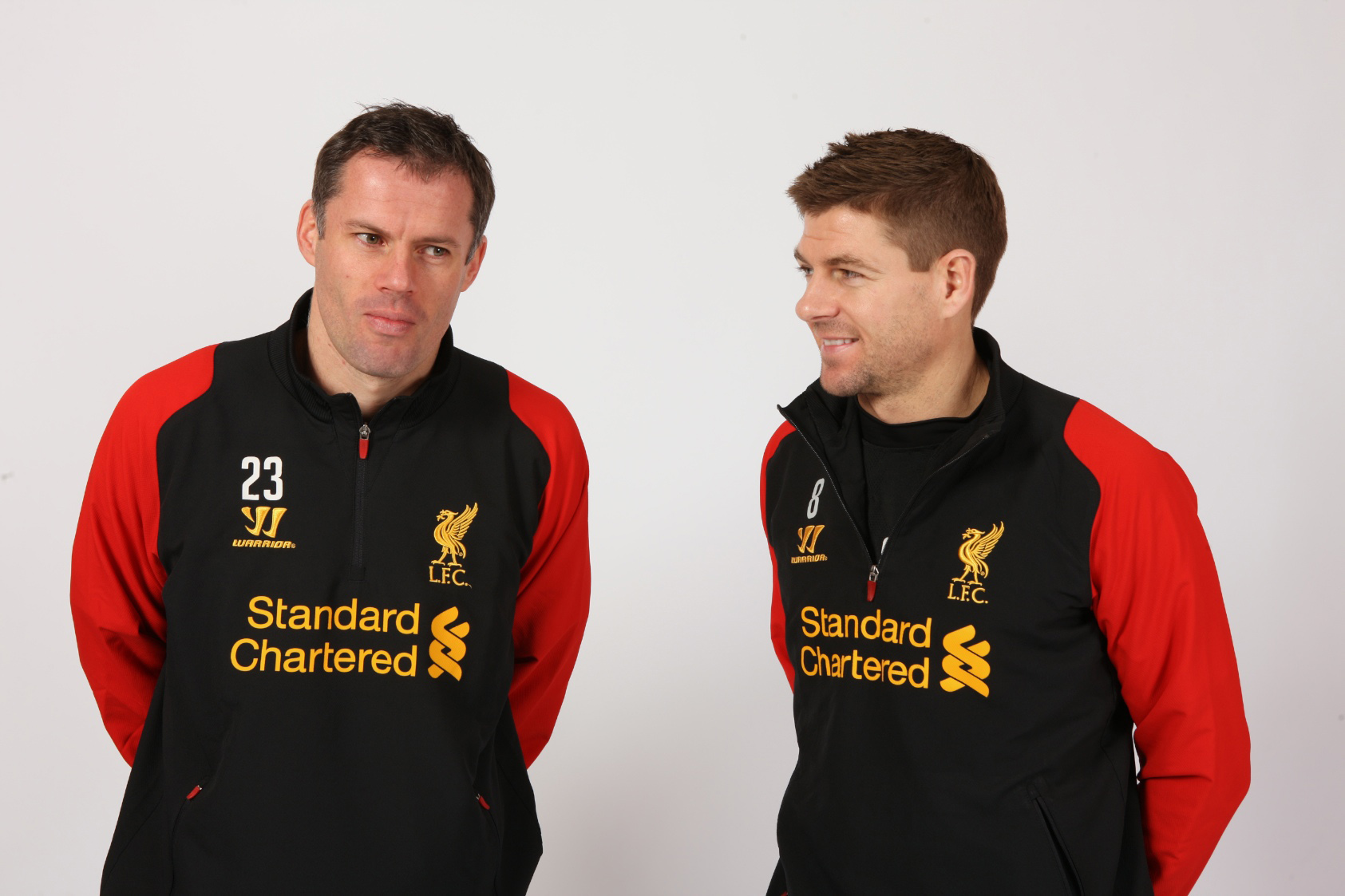
Jamie Carragher: Where do we start... the manager? You want to go first, Stevie?
Steven Gerrard: Brendan has his ideals about how the game should be played, but if that’s not working, he doesn’t suggest an alternative strategy. He wants us to improve that way rather than look for a Plan B or Plan C.
JC: Every manager is different and they all have their own ideas. It’s obvious to see that he wants us on the ball a lot more than in the past. Hopefully things will continue to progress and he’ll be here a good few years.
SG: Under some of the previous managers, when things haven’t being going well we’d tend to go more direct and get the ball forward quicker. But Brendan wants us to play from the back and improve our angles so we pass with more incision and pace. He wants us to stick to Plan A. It’s still early days but the players have all bought into his coaching philosophy and I think we are moving forward.
How does he compare to other managers you’ve had – like, say, Rafa Benitez?
JC: Rafa was great for me. He gave me a run in the side in my best position and I would say he was particularly important to developing my game as a defender. He’s one of the best coaches I’ve ever come across from a defensive point of view.
SG: He helped both of us individually, but was also massive for the team. He was a top manager. I’d be lying if I said I hadn’t had closer relationships with other managers, but professionally it was very good.
Get FourFourTwo Newsletter
The best features, fun and footballing quizzes, straight to your inbox every week.
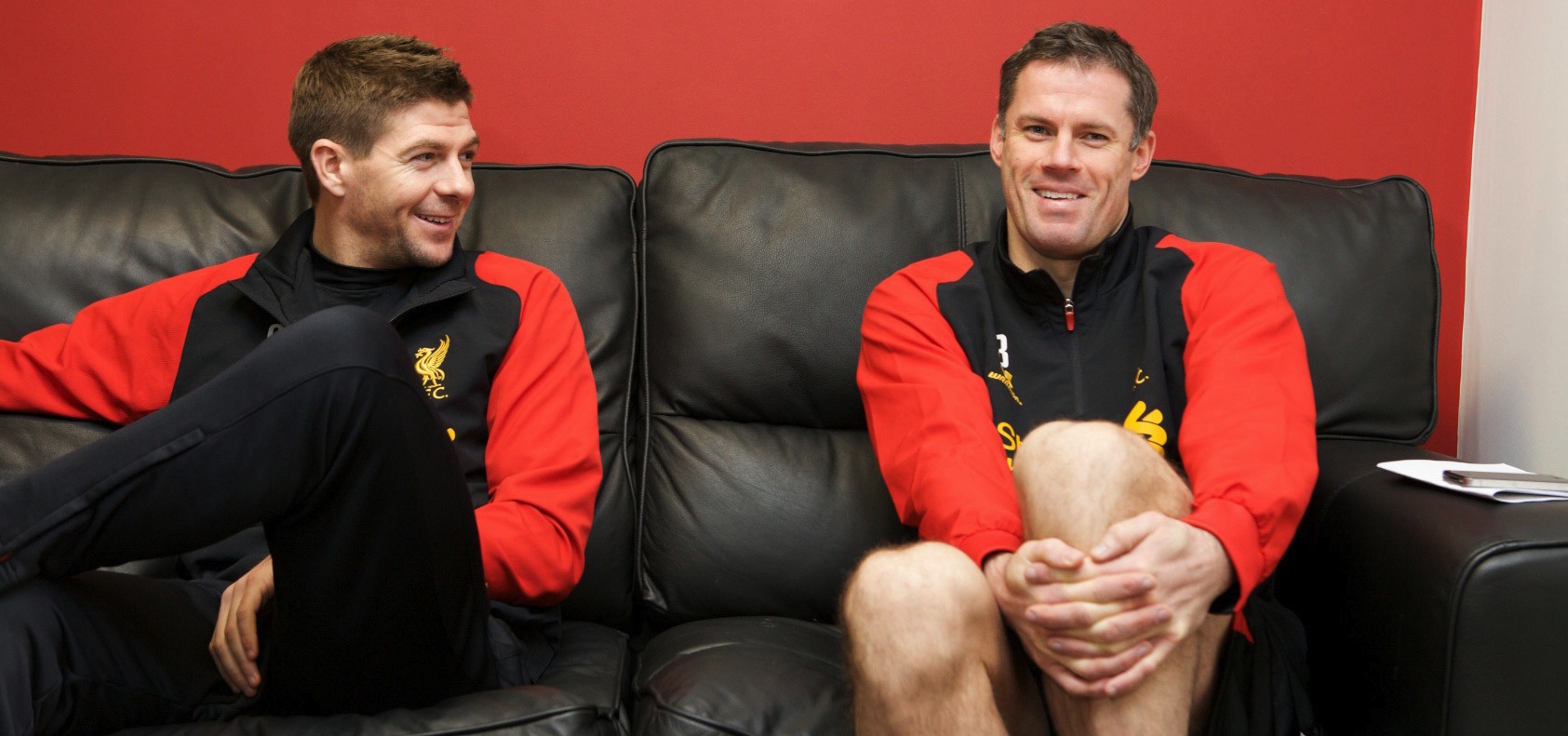
Were you surprised that he joined Chelsea?
JC: To be honest, yes I was, but I suppose he was desperate to get back involved in management. He made no secret of his desire to work with a team that had a chance of winning trophies. We had a big rivalry with Chelsea when he was here, so that’s probably what made it a bit of a shock when I heard. [Turns to Gerrard] I suppose that was one of the factors that stopped you from going there wasn’t it [more of which later], the rivalry between the two clubs...
SG: [Nods]
JC: But listen, he’d been out of the game a long time and needed a route back in.
SG: You’ve also got to consider what happened to him at Inter Milan. I don’t think it went well there. I don’t think he had many other options and when Chelsea came calling he had to grasp it with both hands. I think it was more of a surprise for our supporters because they still have a lot of respect for Rafa. It may have stung a bit to see him join one of our rivals.
FA Cup (2): 2001, 2006
League Cup (3): 2001, 2003, 2012
FA Community Shield (2): 2001, 2006
UEFA Champions League (1): 2005
UEFA Cup (1): 2001
UEFA Super Cup (2): 2001, 2005
Speaking of your fans, as local lads do you think you experience the high and lows at this club in the same way as the supporters – perhaps more so than other players?
SG: I think so. We are Liverpool fans and we come from the area. We know what the supporters want and what it means to them when we play. That’s one of the first things I noticed about Jamie and it remains the same to this day – his will to win and his desire to give everything he can for the supporters.
JC: I’d say much the same about Stevie. We are different players but when we lose your heart is in the gutter, just like the fans.
SG: I think that’s the difference, isn’t it? When you go out of a cup, lose a match or have a bad experience, you feel it more as a local lad. I think we probably feel that pain more. It hurts us and we take it home with us. Since the day I made my debut I’ve noticed a difference with some of the foreign players. Yes, they want to win, but it’s a different type of hurt as a local lad.
How important is it that Liverpool continue to promote local talent to the first team?
JC: It is important to have local lads coming through but I think the main thing is that they are good players. If they can be highly talented and local then that’s the ideal situation.
SG: The fans relate to local players and that’s why it’s important. But the key thing, like Jamie says, is that they are good enough. You can’t just bring players through based upon sentiment. They may put everything on the line for the club but they have to play at a high standard too. For me, they need to understand what it takes to be a Liverpool player. Until you actually get in the first team or play week in, week out, you don’t really understand the sacrifices you have to make.
JC: A lot of big transfer fees have been paid and, to be honest, wasted over the years, so a local player making the grade is important from a financial point of view too.
A lot of big transfer fees have been paid and wasted over the years, so a local player making the grade is important"
Do you remember your time as young academy players? What did you make of each other when you first crossed paths?
SG: I was a YTS lad when I met you, wasn’t I?
JC: Yeah.
SG: He’s a few years older than me so he was in the first team set-up and I used to come in and do a few jobs around the dressing room. I remember getting a bit of verbal off him. We didn’t play together until I broke into the first team so that was my first real experience of Carra. He still gives me stick now.
JC: I don’t remember giving you that much stick – or you doing that many jobs for that matter! I’m a bit older and you tend to keep an eye out for the lads coming through. I’d speak to some of the academy coaches at the time, like Steve Heighway and Dave Shannon. The same names would always crop up. Stevie’s was one of them. He was always thought of as a first-team player in the making. It was just a case of when it was going to happen. When I saw him in training I knew he was going to be a top player.
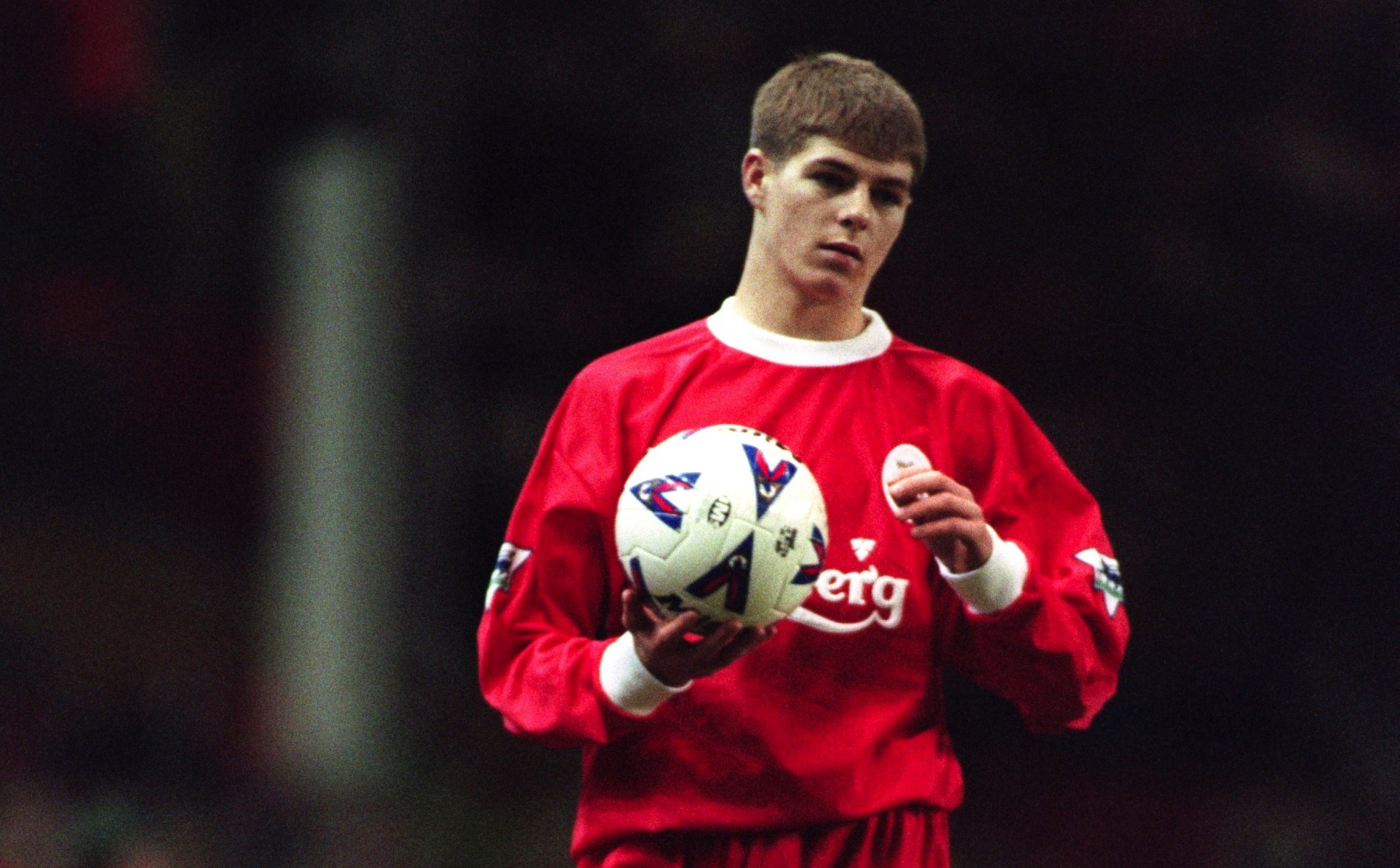
You’ve shared some thrilling highs as players together, haven’t you?
JC: Everyone always talks about the Champions League win, and rightly so, but when you think about it, winning the treble [League Cup, FA Cup, UEFA Cup] in 2001 was a bigger achievement.
SG: The treble win is definitely diluted because of what happened in Istanbul, isn’t it?
JC: A team wins the European Cup every season. But hardly anyone does what we did in 2001. To win three cup competitions in one season is a great feat. And it’s not just the finals. You’ve got to remember there are three quarter-finals and all the semi-finals – every game is massive.
SG: The second half of that season was just big game after big game.
JC: Beating Birmingham City in the Worthington Cup final deserves a mention because it gave us the momentum to go on and achieve what we did. I think we were running on empty in the final week or two and you could see that against Alaves and Arsenal in the finals.
And what of the Champions League Final in 2005 – are there any untold stories from that night?
SG: Not really because people keep on asking us about it! We haven’t been allowed to miss a detail – the fans wouldn’t allow it!
JC: Have you mentioned that you were on the last pen – the one you didn’t have to take?
SG: Yeah, I think people know about that. If they didn’t, then they do now [laughs]. It was a relief that I didn’t have to take it, though. That would have been a really tough penalty. Knowing that if you score you’ve won the cup for your team, but if you miss.... I’m just happy Jerzy [Dudek] made the save. The pressure I was feeling just evaporated.
Winning the Champions League is bigger than winning the Premier League. Would I swap it? No"
How do you reflect on that victory?
JC: It was the pinnacle of my career. The fact that it’s the biggest club competition in the world and the way we won it… it has to be the pinnacle.
SG: I’d have to agree with Jamie. The treble was great but it’s hard to top winning the Champions League.
JC: People might not agree with this but for me winning the Champions League is bigger than winning the league. That’s the one trophy I haven’t won during my time at the club and at this stage in my career it’s unlikely to happen now. I’ve made no secret of the fact that I have a burning ambition to win the league with Liverpool but would I swap that for that Champions League win? No.
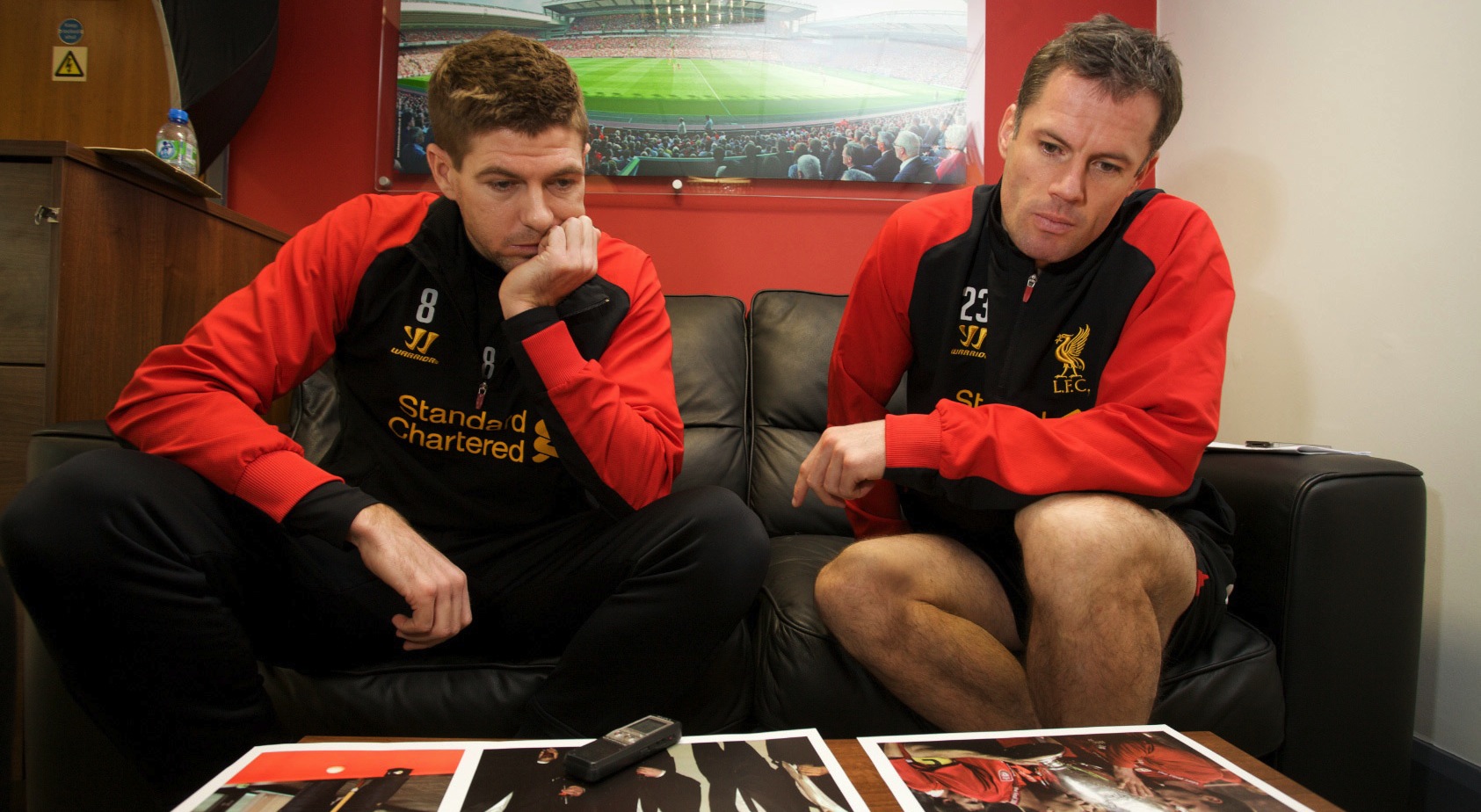
Steven, you had the chance to join a number of other clubs who were contesting the Premier League title after that Champions League victory. What role did Jamie play in convincing you to stay?
SG: He was important, of course. He was one of the ones I confided in when I had my head turned at certain times. He just gave me the right advice as a mate, but he was obviously biased towards this club!
JC: Stevie’s one of those players that all of the top clubs in the world would love to have. I know some supporters feel you should never have your head turned but for me he is one of the most loyal footballers in the game – not just at this club. Some of the sides who have been interested in him over the years are top, top clubs. He’s mentioned them to me at different times and a lot of players would want to move. But Stevie didn’t. It means more to win trophies here, doesn’t it?
SG: Definitely. I think it’s important that when you are a young player you have people around you who are a bit more mature. When these things happen, they have a bit more experience of life and the football world as a whole. They give you advice and might say one thing that stops you doing something that you would later regret. Playing and winning trophies at this club means everything to me.
Like the 2006 FA Cup Final?
JC: You mean the Steven Gerrard final? That’s what they're calling it, isn’t it?
SG: [Laughs] The main thing is we won it.
JC: Did you hear the announcement for injury time?
SG: Yeah, I could hear everything. We were all cramping up, weren’t we? It was a hot day and I think we underestimated West Ham. We thought we were going to win by two or three. But it was the biggest game of their careers for most of their players and they were right up for it. They started well and shocked us. But credit to the lads, we managed to turn it around.
JC: You were brilliant that day. You won us the FA Cup. We’d had a great season and done really well in the league [finishing third, a point behind second-placed Manchester United]. We’d also had a great run in the cup and beat Chelsea again in the semi-final.
SG: When you look at all the finals that we’ve won, more often than not we’ve done it the hard way, haven’t we?
JC: Yeah, we’ve climbed a few mountains...
SG: Ha ha! We’ve entertained over the years when it has come to cup finals. Some of those games have been crazy and it’s great looking back knowing we were a part of it.
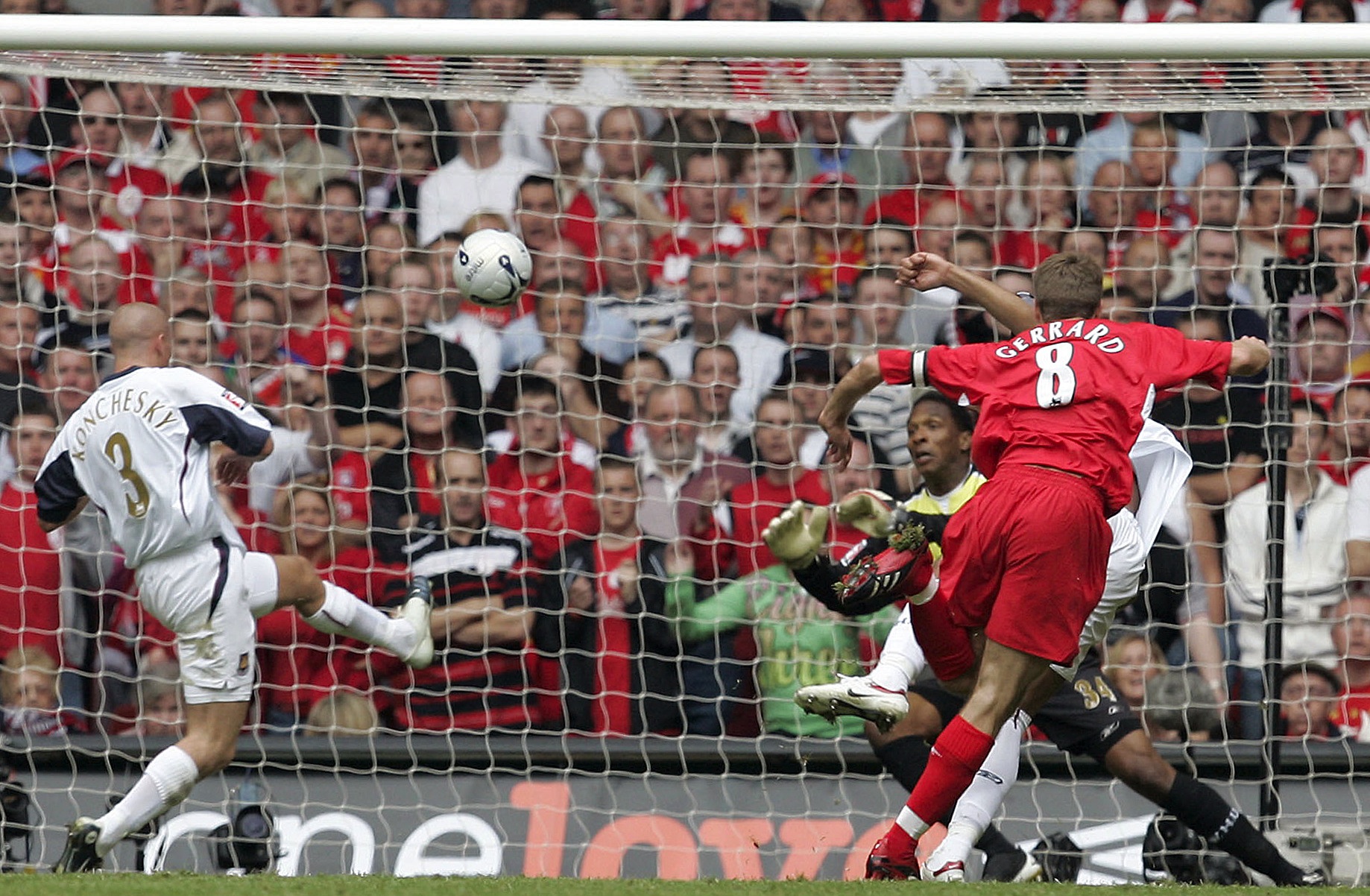
How do your memories of playing for Liverpool compare to those playing for England?
SG: I think it’s difficult for any England player in modern times to look back at their international career and say it has been successful. You only get a chance to win a trophy every couple of years and we don’t seem to be able to get past this quarter-final hurdle. Every England player of our generation is going to look back and have certain regrets.
JC: It’s great for me to have played at a couple of World Cups. But Stevie has had a much longer and better international career than me. If I’m honest, at times I haven’t achieved what I would have liked with England. That was sometimes down to the fact there were better players in my position. That’s just one of those things. But I’d like to have played more for my country. I wish I could have been more of a regular – a mainstay of the team – but it wasn’t to be and that was disappointing.
SG: For me the last couple of years have been my best. I found it hard to find consistency in an England shirt when I was younger, but recently I’ve found a good level on a more regular basis. I think the captaincy may well have played its part in that. I’ve enjoyed the responsibility and feel proud to have the role.
JC: Don’t get me wrong – while I haven’t achieved what I wanted with England, it is a great honour to play for your country. I grew up watching England in Mexico '86 and was made up when we reached the semi-finals in 1990. That gives you the buzz and the desire to follow in the footsteps of those players. We’ve both gone right through the age groups with England and there is a great deal of pride in that.
I found it hard to find consistency in an England shirt when I was younger"
Is taking a penalty for England any different to taking one for Liverpool?
SG: Any penalty shootout is difficult because of the pressure. It’s all right taking them and scoring in training – that’s easy. But when you have that pressure in a big-game situation, the fear of failing makes it a completely different proposition. Jamie was unlucky because he scored his first attempt against Portugal in 2006 but he was made to retake it, which was a mistake by the referee in my opinion. I managed to score my last one for England but I didn’t enjoy taking it because of the anxiety that comes with it.
JC: The penalty in Germany was just one of those things. I made a mistake on my run-up. I was that focused on where I was going to put the ball that I just turned and went. I should have waited for the referee’s whistle. It was an error that cost us. In hindsight I should have just blasted the next one rather than try to place it. But I’m not one of those who will bemoan a lack of luck or complain about having to retake it. That’s the drama of penalties. They can go either way.
SG: You were particularly unlucky having to retake it, though. The first attempt was a great penalty. I think the players deserve credit for having the courage to step up as well. I’m not going to name names but there have been players in the past who have been asked and refused to take one. So the lads who have stood up to be counted, whether they have scored or missed, deserve to be acknowledged for doing what they could for the cause. Hopefully when we are competing in the next tournament we’ll get that bit of luck you need if we’re faced with another shootout. I’d love to get past the quarter-finals.
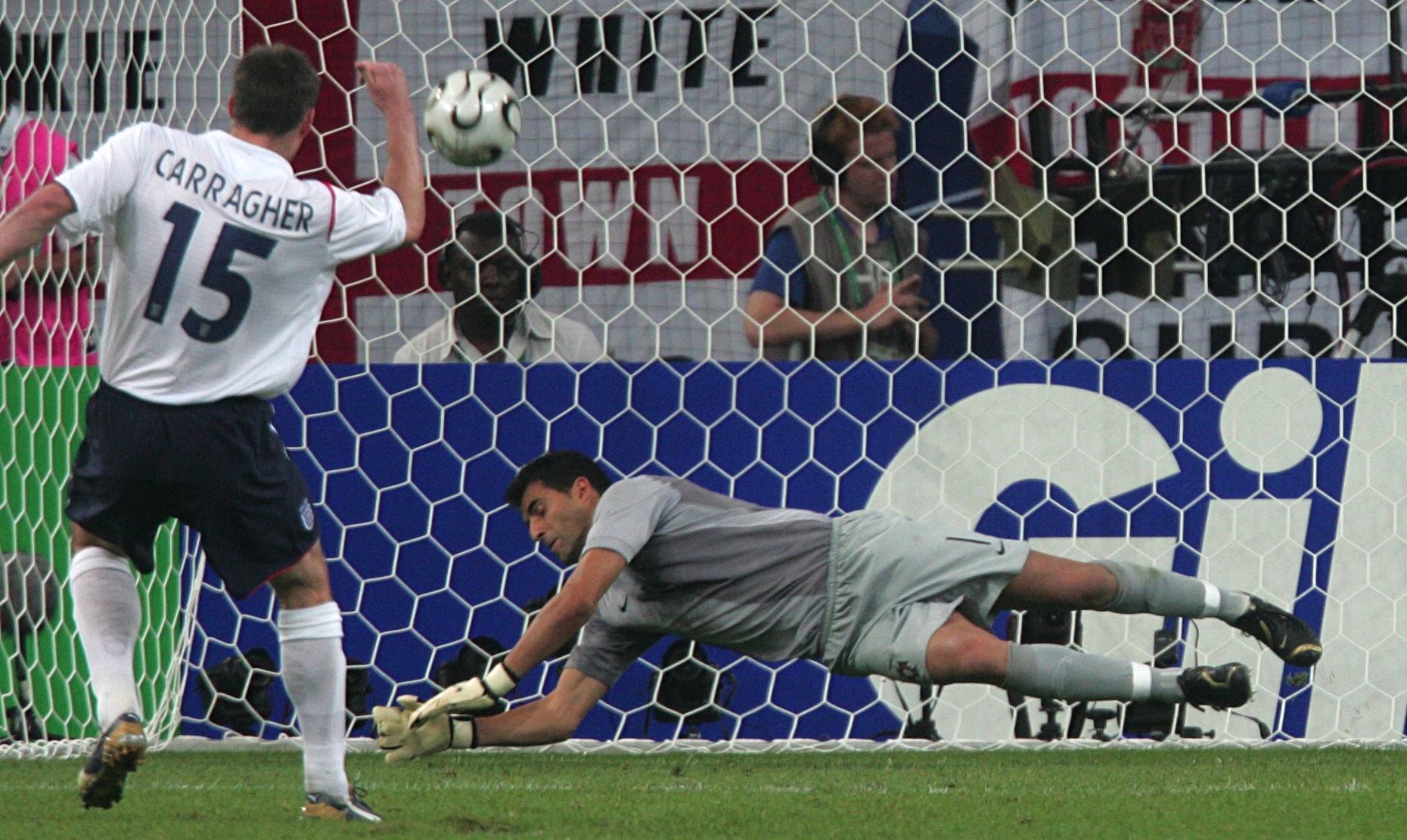
Will that happen?
SG: You have to be realistic and say we aren’t one of the favourites. England are in there with a group of eight to 10 sides that can do well in Brazil. But who knows what shape we’ll be in when the World Cup comes around? A lot can happen in a couple of years so we’ll have to wait and see.
JC: I was just about to say that the first priority is to qualify. That’s never easy but you would expect England to make it to Brazil. Then you’ve got to consider the fact it is on a different continent with a very different climate to contend with. That will make it that much harder. If England get to the quarter-finals I think they will have done well. I know Stevie wants to get past that barrier but I think that’s the more realistic aim. It’s going to be a huge tournament for the South American teams and I think Uruguay, Argentina and Brazil will be desperate to try and win it. They are all very strong teams and will have massive support behind them. So for me, a place in the last eight would be something that should be considered as a success. If we progressed beyond that and made it to the last four it would be fantastic.
If England get to the quarter-finals I think they will have done well. I know Stevie wants to get past that..."
Who would win: a team of Carraghers or a team of Gerrards?
JC: That’s not even worth thinking about. It would obviously be a team of Gerrards.
SG: [Laughs] Do you reckon? I think it would be a boring 0-0. I’d never score against you – and I couldn’t see you finding the net either!
JC: [Laughs] Yeah, it would probably be a low-scoring affair... a couple of clean sheets!
Parity on the pitch... what about off it? Who’s the worst dressed?
SG: [Turns to Jamie] Do you want to go first?
JC: [Laughs] Erm... You’ve had some real rascal gear, haven’t you?
SG: I think we’re both guilty of wearing some rascal gear over the past 14 or 15 years. We try to keep our feet on the ground and stick to what other Scousers are wearing. We don’t want to change too much. The London lads and foreign lads don’t appreciate the Scouse dress sense, so we’ve developed some thick skin from the stick we’ve taken!
Finally, where do you see yourselves in five years’ time?
SG: I don’t know. We talk about it most days. I’d like to stay involved in the game in some capacity. Whether that’s at this club or in the media, I don’t know. But we’ve known nothing different since we left school, so I’d like to stay in the game.
JC: I’m not sure but whatever it is, I think we’ll always be involved in football. We’ll look at our options when we finish and decide what is best for ourselves and for our families.
